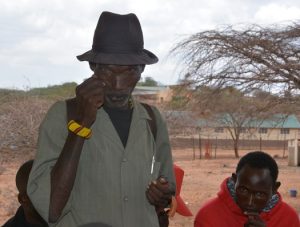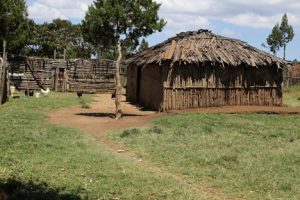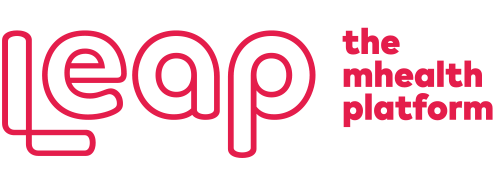Taking strides to end Trachoma in Samburu County
The Samburu are a nomadic community well known for their love of livestock. Cultural limitations, ignorance, lack of role models and lack of education have all played a part in the poor water and sanitation practices in Samburu County, Kenya. Only 20% of the population in Samburu County practice facial hygiene and wash their hands during the four critical times. The poor hygiene practices have propelled the spread of Trachoma (TT), a chronic eye condition caused by Chlamydia Trachomatis bacterium. The bacterium produces a component that roughens the inner surface of the eyelids, causing eye lashes to turn inwards and rub onto the eyeballs. The disease is spread through contact with eye discharge from an infected person. It is with this in mind that Amref Health Africa, in partnership with Sight-Savers through the Kenya Elimination of Trachoma Programme, embarked on training Community Health Workers (CHWs) on Trachoma through Leap, the mHealth platform.

Charles demonstrates how he successfully identified a Trachoma client
“I loved all topics I covered. But, one topic that I have actively applied in my village is the one on Trachoma,” states Charles Leparsaiya, a 65-year-old CHW in Barsaloi Community Unit (CU) who benefitted from the programme. Charles’ best friend and neighbour had suffered from Trachoma for seven years. At the time, he thought that old age was the cause of his misery. In fact, Charles was patiently, and sadly, waiting for his eyes to also go bad. “When I learnt that the condition was treatable, I was shocked but relieved,” he says. “I remember I used to call young children to pluck his eye lashes every morning, in an attempt to ease his pain. To think that he did not have to go through this as Trachoma is preventable, makes me very sad,” Charles explains.
Determined to help his friend, Charles convinced him to go for an eye camp that was taking place at Barsaloi. He was examined and qualified for surgery, and although he was scared, he went through with it. “After the surgery, he was scared because his eye had been covered and he could not see. But I convinced him that it was covered to keep away the flies,” he recalls. “The very next day, the doctors removed the eye patch and my friend was very happy that his sight had been restored. In fact, we realised he could see much better compared to all of us,” says Charles, letting out a chuckle.
The success of his friend’s surgery motivated Charles to actively visit his households so as to identify people suffering from Trachoma, those in need of eye drops and eye glasses, and refer them accordingly.

A clean homestead in Samburu County
A grandfather of five, Charles is very grateful for the training received on Trachoma. Through CHWs such as Charles, the region has seen an increase in the number of Trachoma referrals, referred patients who tested positive for Trachoma, and those who qualified for surgery. The post-surgery follow ups have also been helpful. “I advised my friend and his family on importance of hygiene. I advised them to wash their faces every morning with clean water, to keep the compound clean and to wash their hands during the critical times,” he adds.
Age did not bar Charles from learning through Leap. “We received lessons on our mobile phones. We read and even did exams on our phones! The group chat was also very helpful for clarification purposes,” Charles concludes.
Amref Health Africa, in partnership with Sight-Savers through the Kenya Elimination of Trachoma Programme, has trained 336 CHWs on Trachoma through Leap, the mHealth platform. Leap, an innovation by Amref Health Africa, allows partners to train CHWs on various health topics in an easy, efficient and effective way. Through strengthened support, peer collaboration and continous learning, Leap empowers CHWs with knowledge on health issues affecting their communities through their mobile phones. This allows them to learn, interact with each other (and with their supervisors) as well as be examined on topics covered, all through their mobile phones. Leap has been successfully implemented across rural, urban and nomadic regions in Kenya. – Story by Michelle Dibo

